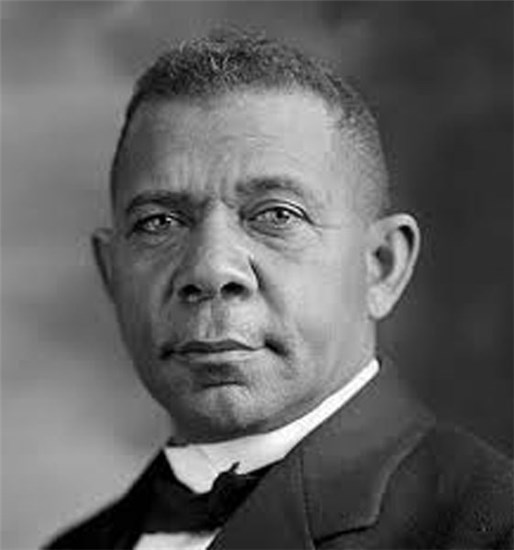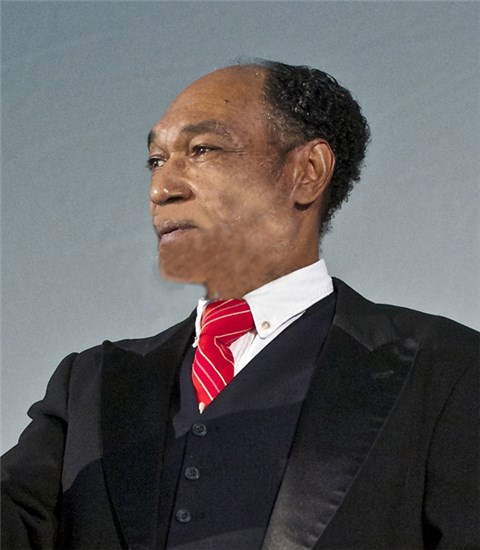

BOOKER T. WASHINGTON (1856-1915)
by Charles Pace
In founding and developing Tuskegee Agricultural Industrial and Normal Institute, his most enduring legacy, Booker T. Washington explored boundaries between education and entrepreneurship. In the process, he amassed a power base that no other black and very few whites could match.
It is particularly instructive to note how he turned obstacles into opportunities at the intersections of race and region, personal and political, and national and international. As a result, Washington emerges not only as the most powerful black leader then in existence, but perhaps, as the most powerful black leader that ever will exist in America.
Washington, a keen observer of his environment, informs us: “During the whole of the Reconstruction period our people throughout the South looked to the Federal Government for everything, very much as a child looks to its mother.” Washington worked at developing a producer class of black people, equating independence with the production of “something that the world wants.”
He first observed this economic determinism model as a student at the Hampton Institute, and developed it into the guiding principle of Tuskegee Institute. Through the production of agricultural, small scale industrial, trained personnel (his primary “products”), as well as ideas perceived as non-threatening to the Southern racial status-quo, Washington expanded his influence.
Washington also gained valuable insight at Hampton into the cultural nature of inter-racial contact. First as a student, between whites and blacks, and later as a teacher, between reds, whites and blacks, Washington began developing his theory about how relations between the races might be improved. Hampton’s founding principal, General Samuel C. Armstrong, father-figure and mentor, placed Washington in charge of the “Indian School” at Hampton.
Through these experiences, Washington’s genius for the management of the political domain of human affairs quickly emerged. He made it clear that he harbored no desire for political position, and would refuse any political appointments, if offered. Instead, Washington became a master political operative. Understanding that all politics is local, he increasingly brought public prestige to his local and regional area, arranging a Tuskegee Institute visit by President William McKinley and a visit by his friend President Theodore Roosevelt, whom he called “the Governor.” At Tuskegee’s 25th anniversary in 1906, Charles W. Eliot, President of Harvard University; Andrew Carnegie, his dear friend and major benefactor; and William Howard Taft, Secretary of War and future U. S. President shared the stage with him as principal speakers. Black journalist J. Max Barber summed up the significance of their presence as representing “The three classes which run this country (culture, economics and politics); and they all joined in the praise of Booker Washington and pledged him their support.”
The address that Washington delivered in 1895 at the International Cotton States Exhibition in Atlanta began his international influence. It grew over the years through three high- profile trips to Europe, where he met with writers, educators, noblemen and noble women. He was “wined and dined” by American ambassadors and ruling monarchs. All sought and he gladly gave of his time, advice and valued presence.
Our study of Booker T. Washington grants us insight into creativity, leadership, and innovation, and how academic culture can serve as an entrepreneurial engine to power the transition from the entrepreneurial imagination to its realization.
RECOMMENDED READING
Harland, Louis R. Booker T. Washington: Volume 1: The Making of a Black Leader, 1856-
1901. New York: Oxford University Press, USA, 1975.
Harland, Louis R. Booker T. Washington: Volume 2: The Wizard of Tuskegee, 1901-1915.
New York: Oxford University Press, 1983.
Washington, Booker T. Up from Slavery: An Autobiography. Dover Publications, 1995.
CHARLES PACE
Charles Pace was a program advisor for the Texas Union, University of Texas at Austin, and taught at The University of Nebraska–Lincoln, Purdue University, and Centre College of Kentucky. Pace graduated from Texarkana Community College, The University of Texas at Austin (B.A. Biology) and Purdue University (M.A. American Studies--History/Anthropology). A 17-year veteran of the Great Plains Chautauqua, Pace and George Frein gave the keynote address at the final Presidential debate between Senators John McCain and Barack Obama. Pace has also conducted U.S. Government Public Diplomacy Missions in 25 cities and nine countries across Africa. He does Chautauqua presentations as Frederick Douglass, Booker T. Washington, W.E.B. Du Bois, Langston Hughes and Malcolm X. Charles Everett Pace is a full time Chautauquan, a Silver Life Member of the NAACP, travels nationally and lives in Texarkana, Texas. To learn more about Pace, visit www.charleseverettpace.com
QUOTES
“No race that has anything to contribute to the markets of the world is long ostracized. . . . The opportunity to earn a dollar in a factory just now is worth infinitely more than the opportunity to spend a dollar in an opera-house.”
– BTW, 1896
“In all things that are purely social we can be as separate as the fingers, yet one as the hand in all things essential to mutual progress.”
– BTW, 1896
“To me he seems one of the foremost of living men because his work is unique. The modern Moses, who leads his race and lifts it through education . . . History is to know two Washingtons, one white, the other black, both Fathers of their People.”
– Andrew Carnegie
“Mr. Washington's scheme is to have such a control over his teachers they will tremble at his approach. Most teachers like to see the train pull off with him and dread to hear the engine whistling his return.”
– G. David Houston, 1906, young Tuskegee faculty member
“Now the Tuskegee Institute has more income than the University of Alabama, The Polytechnic Institute (white), and the Girls' Industrial School (white) combined, and they are educating them to how? To hate us.”
– Washington critic, State Representative Sam Will John of Birmingham
“So far as Mr. Washington preaches Thrift, Patience, and Industrial Training for the masses, we must hold up his hands and strive with him. . . . But so far as Mr. Washington apologizes for injustice . . . does not rightly value the privilege and duty of voting . . . and opposes the higher training and ambition of our brighter minds . . . we must unceasingly and firmly oppose him.”
– Professor W. E. B. Du Bois, Atlanta University, 1903
TIMELINE
1856 Born on April 5 near Hale’s Ford, Virginia
1865 Moves with family to Malden, West Virginia
1872 Enrolls at Hampton Normal and Agricultural Institute in Hampton, Virginia
1875 Graduates from Hampton Institute; begins teaching a black school in Tinkersville, West Virginia
1878 Attends Wayland Seminary in Washington, D. C.
1879 Returns to Hampton Institute as faculty member
1881 Opens Tuskegee Normal and Industrial Institute in Tuskegee, Alabama
1882 Marries first wife, Fanny Smith
1883 Daughter Portia is born
1884 Fanny Washington dies
1885 BTW marries second wife, Olivia Davidson; son, Booker T., Jr., is born
1889 Son, Ernest Davidson, is born; Olivia Washington dies
1892 First Tuskegee Negro Conference is held; BTW marries third wife, Margaret Murray
1895 Delivers Atlanta Compromise speech at the Cotton States and International Exposition in Atlanta, Georgia, on September 18
1899 Travels to Europe in the first of his trips to the continent
1900 Founds National Negro Business League
1901 Publication of Up From Slavery; BTW dines at the White House with President Theodore Roosevelt and the first family.
1903 Andrew Carnegie gives $600,000 to Tuskegee Institute; BTW travels to Europe
1904 Organizes a three-day conference of black leaders at New York City’s Carnegie Hall; BTW adopts daughter, Laura Murray
1906 Celebrates 25th anniversary of Tuskegee Institute
1909 Refuses to attend conference that gives birth to the National Association for the Advancement of Colored People (NAACP)
1911 Publication of My Larger Education; BTW attacked by Henry Ulrich in New York City
1915 Sponsors National Negro Health Week; dies on November 13 in Tuskegee